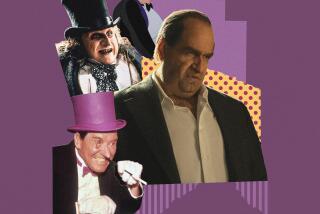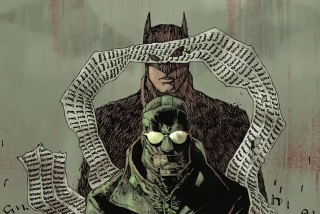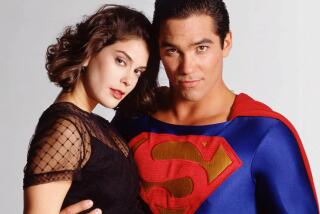Joe Shuster, Co-Creator of Superman, Dead at 78
- Share via
Joe Shuster, who changed the dimension of comic books 54 years ago when he helped create the invincible Superman, yet had to watch through failing eyes as others reaped huge profits from the Man of Steel, is dead.
A county coroner’s spokesman said the artist was 78 and had died Thursday at his West Los Angeles home of congestive heart failure and hypertension.
Writer Jerry Siegel, Shuster’s partner who also never grew rich from the universally loved character, said: “The comic book field has lost a great artist and a true pioneer. I’ve lost a lifelong friend and partner. He’ll be sorely missed.”
Comic books were only 5 years old in 1938 when Shuster and Siegel persuaded the publishers of DC Comics that Superman and his meek alter ego, Clark Kent, were commercially viable.
Before Superman, comic books featured collections of characters that had appeared mostly in newspaper comic strips.
But Shuster and Siegel revolutionized the industry overnight with their tales of the infant from the planet Krypton sent to Earth by his parents when his homeland faced destruction.
Siegel said he created the idea of the interplanetary hero from an amalgam of influences, among them the swashbuckling silent screen stars Douglas Fairbanks Sr. and Rudolph Valentino, and the hair-raising written antics of “The Mark of Zorro” and “The Scarlet Pimpernel.”
He talked his friend Shuster into giving form to the muscular, bulletproof space visitor “able to leap tall buildings in a single bound.”
Both men had come from impoverished childhoods and attended high school together in Cleveland. The first two stories Shuster and Siegel sold to DC Comics were drawn on brown wrapping paper or wallpaper.
Years later, in a retrospective, cartoonist Jules Feiffer attributed the overnight success of the Clark Kent/Superman pairing to the secret longings of boys everywhere:
“The fellow with the eyeglasses and the acne and the walk girls laughed at didn’t exist . . . his fake identity was our real one. That’s why we loved him so. For if that wasn’t really us, if there were no Clark Kents, only lots of glasses and cheap suits which, when removed, revealed all of us in our true identities--what a hell of an improved world it would have been!”
Although their supersonic, crime-busting paragon began making money immediately, Shuster and Siegel had signed the rights to him away for a reported $130 (single copies of Action Comics were to later sell for $4,000), and when they sued for more money in 1947, they were fired. Soon, Superman moved to television with additional thousands in royalties pouring into the comic book company from the 1950s series starring George Reeves. The four even more lucrative feature pictures starring Christopher Reeve were yet to come.
Both men had also lost other court cases for percentages of the Superman products, and in 1975, after what Siegel said “were years of frustration and hell,” they took their case to the public.
“What did we know?” the men said in interviews of their youthful naivete in giving up the rights to their creation.
The campaign worked and an embarrassed Warner Communications Inc.--then the parent company of National Periodical Publications, which controlled the rights to the Superman character--gave Siegel and Shuster lifetime pensions of $20,000 each a year. The pensions were adjusted to $30,000 with bonuses added by Warner Communications, which also distributed the immensely profitable Superman films.
Before that, Siegel had been working as a clerk typist and Shuster was supported by a brother.
By the 1980s, Shuster and Siegel were living in apartments 10 minutes apart in Los Angeles. Shuster had become legally blind and unable to draw for several years.
Looking back on his life this year, Shuster, a bachelor who was born in Toronto and moved to Cleveland when he was 10, said he had used the Canadian city as a model for the fictional city of Metropolis in the Superman comics.
“Cleveland was not nearly as metropolitan as Toronto was, and it was not as big or as beautiful. Whatever buildings I saw in Toronto remained in my mind and came out in the form of Metropolis,” Shuster said in an interview with the Toronto Star.
He also said he had been captivated by the comics as a toddler. Every night his father would return from his tailor shop in Toronto’s garment district and read him the newspaper comics--the Katzenjammer Kids, Boob NcNutt, Little Nemo--all printed in vivid color.
“Later on, I began to read the comics myself and I had hopes of someday drawing a comic strip of my own,” Shuster said.
So if Superman had been inspired by the acrobatic antics and swordplay of film stars, whence came Clark Kent (whose name was derived from actors Clark Gable and Kent Taylor)?
He was, said Siegel in a long-ago interview, a melding of shy, bespectacled film comic Harold Lloyd and a pale, mild-mannered young artist and friend named Joseph Shuster.
More to Read
The biggest entertainment stories
Get our big stories about Hollywood, film, television, music, arts, culture and more right in your inbox as soon as they publish.
You may occasionally receive promotional content from the Los Angeles Times.










